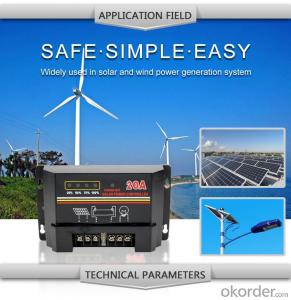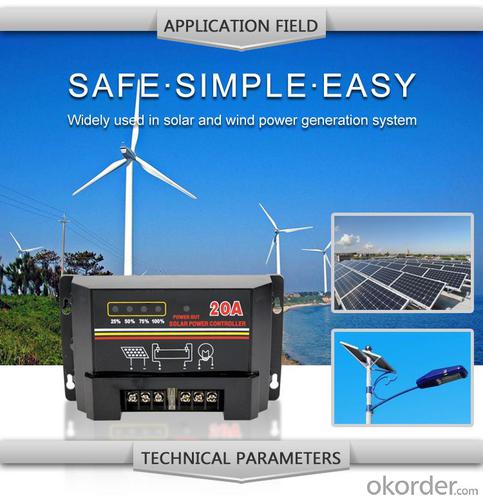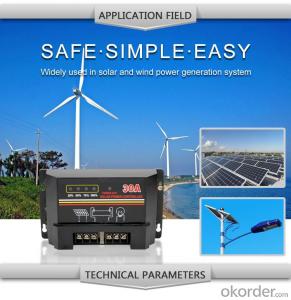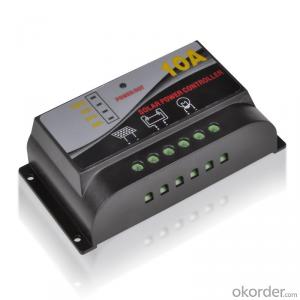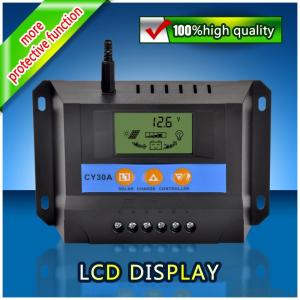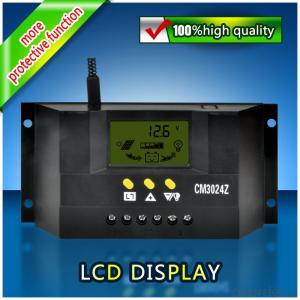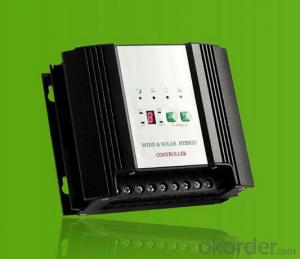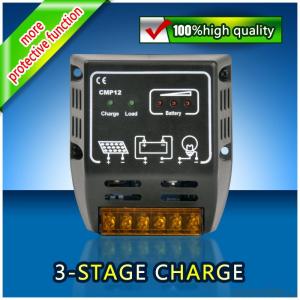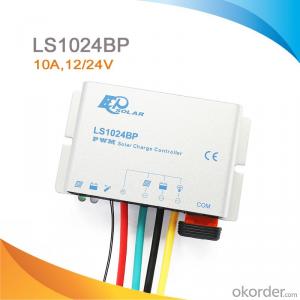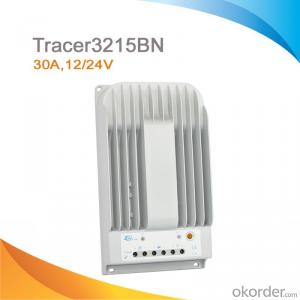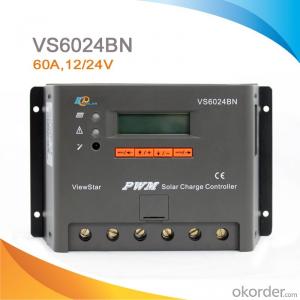Pwm 30A Solar LCD Controller with Best Price Hot Selling Model DM120A
- Loading Port:
- China main port
- Payment Terms:
- TT or LC
- Min Order Qty:
- 1 unit
- Supply Capability:
- 10000 unit/month
OKorder Service Pledge
OKorder Financial Service
You Might Also Like
Production Introduction
Solar controller is control device which can control solar panel and transform solar energy into electricity then store to the battery bank. Solar controller is the most important part in offgrid system, whose performance has much effect on life expectancy and operation of the whole system, especially the battery expectancy.
Application Areas
Standalone Photovoltaic power station
Standalone Domestic household photovoltaic power system
Mobil communication base stations, expressway and other non-residential regions.
Coastal islands, remote mountainous, border posts for regions shortage of or without electricity.
Government demonstration projects, landscape lighting project etc.
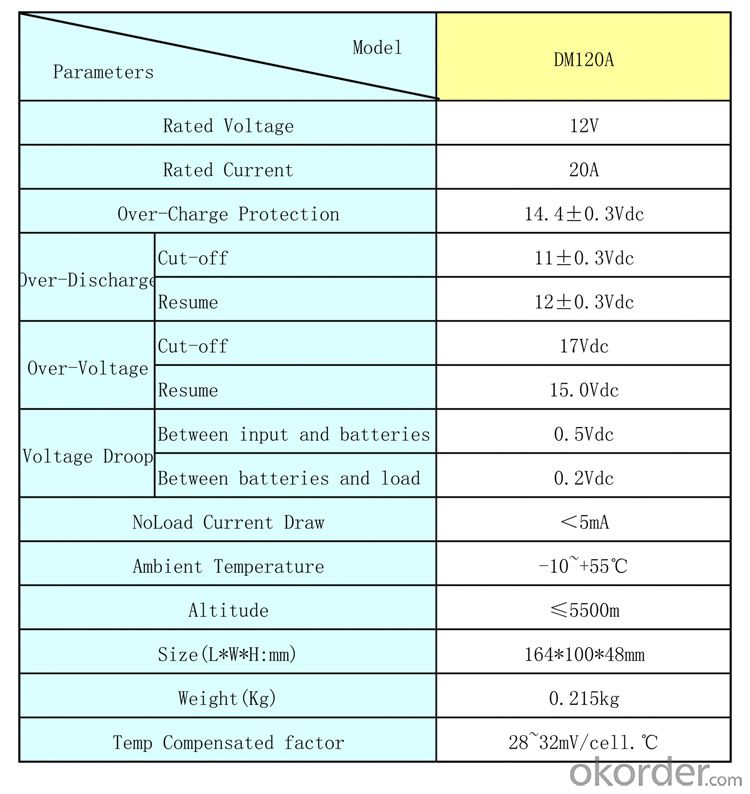
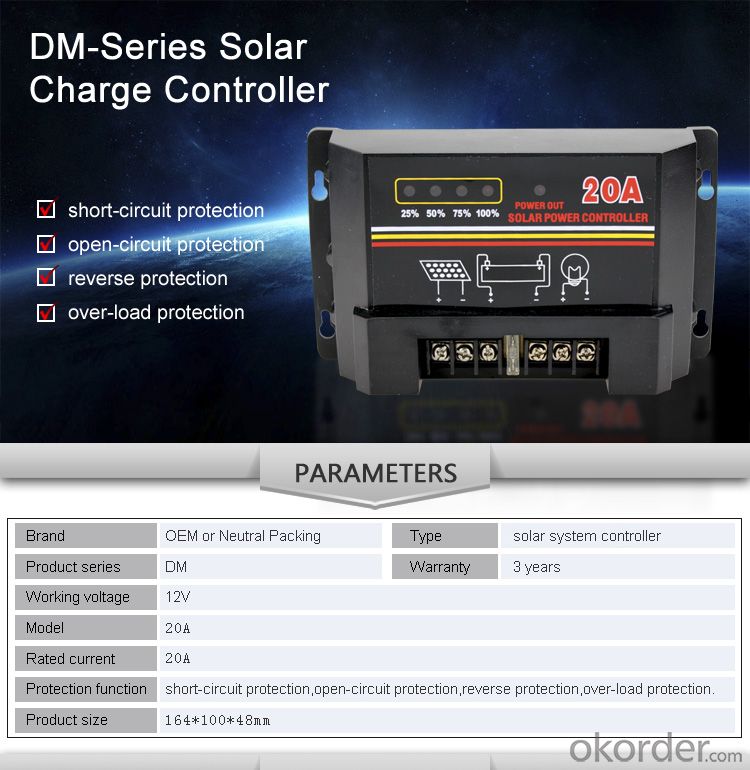
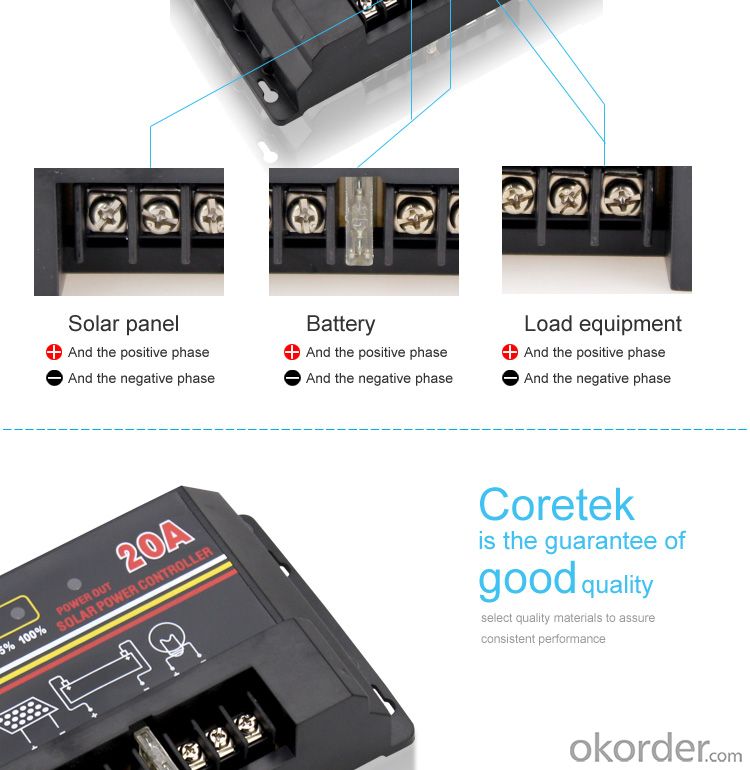
- Q: What is the role of a temperature sensor in a solar controller?
- The role of a temperature sensor in a solar controller is to measure the temperature of various components, such as the solar panels or batteries, and provide this information to the controller. This allows the controller to make adjustments and optimize the performance of the solar system based on the temperature conditions. For example, if the temperature exceeds a certain threshold, the controller may reduce the charging rate to prevent overheating and potential damage. Overall, the temperature sensor helps in maintaining the efficiency and safety of the solar system.
- Q: How does a solar controller handle battery under-voltage disconnect recovery?
- A solar controller is responsible for regulating the charging and discharging of batteries connected to a solar power system. When it comes to handling battery under-voltage disconnect recovery, the solar controller plays a crucial role. Under-voltage disconnect (UVD) is a protective feature in a solar controller that disconnects the battery when its voltage drops below a certain predetermined threshold. This is done to prevent the battery from being completely discharged, which can result in irreparable damage. In case the battery voltage falls below the UVD threshold, the solar controller will initiate a recovery process. The exact method employed can vary depending on the specific controller model and its capabilities. However, the general principle is to disconnect any loads connected to the battery to prevent further discharge and allow the battery to recharge. Once the battery is disconnected from the loads, the solar controller will typically monitor the battery voltage continuously. It will wait until the battery voltage reaches a predetermined level that is considered safe for reconnection. This level is usually higher than the UVD threshold to ensure that the battery has sufficiently recovered before being reconnected. Once the battery voltage has reached the safe level, the solar controller will automatically reconnect the loads, allowing the system to resume normal operation. This process ensures that the battery is protected from deep discharge while also allowing it to recover and continue providing power to the connected loads. It's important to note that the specific settings and parameters for under-voltage disconnect recovery can often be customized or adjusted based on user preferences and system requirements. This flexibility allows users to optimize the performance and protection of their solar power system according to their unique needs. In conclusion, a solar controller handles battery under-voltage disconnect recovery by disconnecting loads when the battery voltage falls below a certain threshold, continuously monitoring the battery voltage, and automatically reconnecting the loads once the battery has sufficiently recovered. This process helps protect the battery from damage while ensuring the smooth functioning of the solar power system.
- Q: What are the different types of solar controllers available?
- There are three main types of solar controllers available: PWM (Pulse Width Modulation) controllers, MPPT (Maximum Power Point Tracking) controllers, and basic on/off controllers.
- Q: Can a solar controller be used with solar panels that are connected to a solar heating system?
- Yes, a solar controller can be used with solar panels that are connected to a solar heating system. The solar controller helps regulate and optimize the flow of energy from the panels to the heating system, ensuring efficient and effective utilization of solar energy for heating purposes.
- Q: Can a solar controller be used with thin-film solar panels?
- Yes, a solar controller can be used with thin-film solar panels. Solar controllers are designed to regulate and manage the charging process of solar panels, regardless of the type of panel technology being used. Therefore, they can effectively control the charging and prevent overcharging of thin-film solar panels, ensuring optimal performance and longevity.
- Q: Can a solar controller be used with solar panels that have different wattages?
- Yes, a solar controller can be used with solar panels that have different wattages. The solar controller regulates the charge going into the battery bank and is designed to accommodate panels with varying wattages. However, it is important to ensure that the combined wattage of the panels does not exceed the maximum input capacity of the solar controller to avoid any potential damage.
- Q: Can a solar controller handle power fluctuations from the grid?
- No, a solar controller cannot handle power fluctuations from the grid. A solar controller is designed to regulate and control the charging process of solar panels and batteries, and it does not have the capability to stabilize or handle power fluctuations from the grid.
- Q: Can a solar controller be used with solar panel snow melting systems?
- Solar panel snow melting systems can indeed utilize a solar controller. A solar controller is an indispensable element for all solar systems, including those designed for snow melting. Its purpose is to effectively regulate and enhance the power output of the solar panels, thus ensuring efficient and safe operation. When it comes to snow melting systems, the solar controller assumes a vital role in managing the power supply to the heating elements responsible for melting the snow. It diligently monitors the energy produced by the solar panels and regulates the flow of electricity to the heating elements based on factors such as the ambient temperature and the presence of snow or ice. Moreover, the solar controller is equipped to prevent overheating of the heating elements by adjusting the power supply as required. Additionally, it offers valuable data and diagnostic capabilities, enabling users to monitor the system's performance and troubleshoot any arising issues. To sum up, the inclusion of a solar controller is imperative for a solar panel snow melting system, as it facilitates the regulation and optimization of the power supply to the heating elements, thereby ensuring efficient and safe operation.
- Q: Can a solar controller be used with solar-powered indoor transportation hubs?
- Yes, a solar controller can be used with solar-powered indoor transportation hubs. A solar controller is a device that regulates the flow of electricity from solar panels to batteries or other energy storage systems. In the case of indoor transportation hubs powered by solar energy, a solar controller can be used to manage the energy generated by the solar panels and store it in batteries to be used during low-light conditions or when there is high demand for electricity. This ensures a reliable and consistent power supply for the indoor transportation hub, allowing it to operate efficiently and sustainably. Additionally, a solar controller can also provide important monitoring and protection functions, such as preventing overcharging or over-discharging of the batteries, optimizing energy usage, and ensuring the longevity of the solar power system. Therefore, using a solar controller in conjunction with solar panels can enhance the performance and reliability of solar-powered indoor transportation hubs.
- Q: How do I connect solar panels to a solar controller?
- Follow these steps to connect your solar panels to a solar controller: 1. Begin by positioning your solar panels in a location that receives maximum sunlight throughout the day. Make sure they are securely mounted and properly angled for optimal sun exposure. 2. Locate the positive and negative terminals on your solar panels, which are typically labeled as "+" and "-". Consult the user manual or markings on the panels for accurate identification. 3. Once you have found the terminals, make the connections. Attach the positive terminal of the first solar panel to the positive input terminal of the solar controller using a solar panel cable or wire with appropriate connectors. Repeat this step for the negative terminals, connecting the negative terminal of the first solar panel to the negative input terminal of the solar controller. 4. If you have multiple solar panels, follow the solar controller's specifications and your energy requirements to determine whether to connect them in series or parallel. In series connections, link the positive terminal of one panel to the negative terminal of the next panel. In parallel connections, connect all positive terminals together and all negative terminals together. 5. Double-check all the connections to ensure they are secure. Loose connections can result in power loss and inefficiency. 6. Finally, connect the solar controller to your battery bank or power inverter. Most solar controllers have separate terminals for battery connections, labeled as "+" and "-". Connect the positive terminal of the battery to the positive output terminal of the solar controller, and the negative terminal of the battery to the negative output terminal of the solar controller. 7. After completing the connections, power on the solar controller and monitor the charging status. The solar controller will regulate the power flow from the solar panels to the battery bank, ensuring efficient charging and preventing overcharging. Always refer to the user manual provided with your specific solar panels and solar controller for any manufacturer-specific instructions or guidelines.
Send your message to us
Pwm 30A Solar LCD Controller with Best Price Hot Selling Model DM120A
- Loading Port:
- China main port
- Payment Terms:
- TT or LC
- Min Order Qty:
- 1 unit
- Supply Capability:
- 10000 unit/month
OKorder Service Pledge
OKorder Financial Service
Similar products
Hot products
Hot Searches
Related keywords
